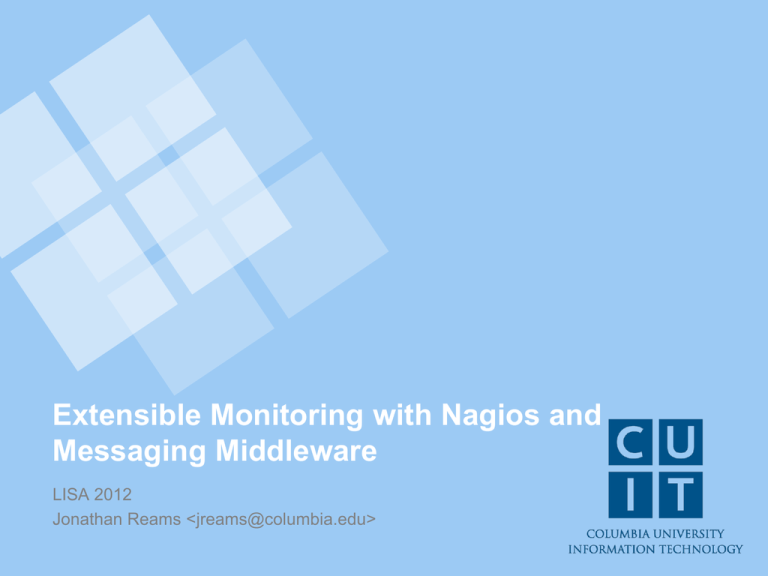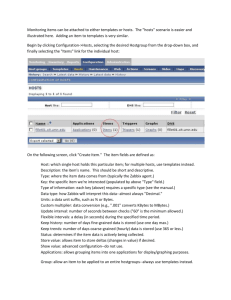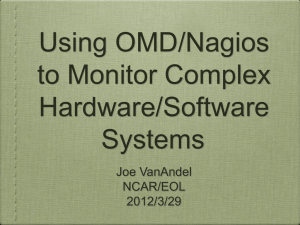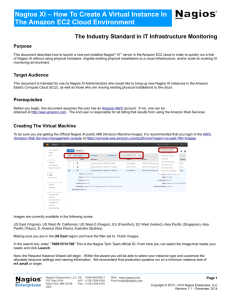Presentation Title
advertisement

Extensible Monitoring with Nagios and
Messaging Middleware
LISA 2012
Jonathan Reams <jreams@columbia.edu>
Symon Says Nagios Project
• Replace 12-year-old home grown monitoring system
– Very customized
– Very engineered
– Very unsupported
• ~17,000 checks
• Mandate to move to Nagios
False Start
1.
2.
3.
4.
Installed Nagios
Ported checks from old system to new
Went out for coffee
Problems
a. High check latency
b. High load
Stock Nagios
Nagios Host
Nagios
Process
Status
Data
File
Check
Results
CGIs
Nagios
Reapers
Check
Processes
Sysadmin
Nagios Problems
• Trapped on one host:
– Check results
– Status data
– Configuration data
• Nagios isn’t a great executor
– Forks 2 processes per check
– Everything is basically synchronous – async achieved
with multiple processes
• Data format is simple but non-standard
Nagios Problems
• Implementation is all in C – hard to customize
• Can be I/O bound by reading/writing check result files
• Cannot query data from status file/configuration without
reading/parsing all of it
• Input via FIFO gives no feedback and has a limited
buffer size
Nagios Problems
Communication is hard!
My Solution
NagMQ
A ZeroMQ-based API for Nagios
Background on ZeroMQ
•
•
•
•
Broker-less messaging kernel in a single library
Emulates Berkeley socket API
Supports IPC/TCP/Multicast transports
Fanout, pub/sub, pipe-line, and request/reply messaging
patterns
• All I/O is asynchronous after connections are established
with dedicated I/O threads
• Bindings available for large number of operating systems
and languages
• Agnostic of data being sent – no defined data format
NagMQ
Event Publisher & Commands
Host check result from publisher
host_check_processed localhost
{ "host_name": "localhost", "check_type": 0, "check_options": 0,
"scheduled_check": 1, "reschedule_check": 1, "current_attempt": 1,
"max_attempts": 1, "state": 0, "last_state": 0, "last_hard_state": 0,
"last_check": 1354996955, "last_state_change": 1337098090, "latency":
1.63600, "timeout": 60, "type": "host_check_processed", "start_time": {
"tv_sec": 1354996955, "tv_usec": 636453 }, "end_time": { "tv_sec":
1354996964, "tv_usec": 161965 }, "early_timeout": 0, "execution_time":
0.07324, "return_code": 0, "output": "Host up", "long_output": null,
"perf_data": null, "timestamp": { "tv_sec": 1354996964, "tv_usec": 161966 }
}
Command to add an acknowledgement to service problem
{'comment_data': 'Stop alerting me!!', 'notify_contacts': False,
'author_name': ’jreams', 'persistent_comment': False, 'host_name':
'localhost', 'service_description': 'rotate-unix', 'time_stamp': {'tv_sec':
1355074576}, 'type': 'acknowledgement'}
State Data
Request
{'keys': ['host_name', 'services', 'hosts', 'service_description',
'current_state', 'members', 'type', 'name',
'problem_has_been_acknowledged', 'plugin_output', 'checks_enabled',
'notifications_enabled', 'event_handler_enabled'], 'include_services':
True, 'host_name': 'localhost'}
Response
[{'checks_enabled': True, 'notifications_enabled': True, 'current_state':
0, 'plugin_output': 'Host up', 'problem_has_been_acknowledged': 0,
'event_handler_enabled': True, 'host_name': 'localhost', 'services':
['rotate-unix'], 'type': 'host'}, {'checks_enabled': False,
'notifications_enabled': True, 'current_state': 1, 'plugin_output': 'You
are now on call', 'problem_has_been_acknowledged': False,
'event_handler_enabled': True, 'host_name': 'localhost',
'service_description': 'rotate-unix', 'type': 'service'}]
Some examples
• Distributed check execution (mqexec)
• Custom user interfaces (nag.py, etc)
• High availability (haagent.py, halib.py)
mqexec
mqexec
• Asynchronous command executor
• Subscribes to host_check_initiate,
service_check_initiate, and event_handler_start
messages, and executes command line specified
• Can filter which commands to execute based on any
attribute in message
• Receives messages as
– Fair-queued worker pool (pull from MQ broker)
– Individual worker (subscribe directly to NagMQ)
• Sends results back to command interface of NagMQ
Performance: Stock Nagios
18
Latency in Seconds
16
14
12
10
Max Host
Avg Host
Max Svc
Avg Svc
8
6
4
2
0
1 2 3 4 5 6 7 8 9 10 11 12 13 14 15 16 17 18 19 20
Time in Minutes
Performance: NagMQ/mqexec
18
Latency in Seconds
16
14
12
10
Max Host
Avg Host
Max Svc
Avg Svc
8
6
4
2
0
1 2 3 4 5 6 7 8 9 10 11 12 13 14 15 16 17 18 19 20
Time in Minutes
User Interfaces
• Command-line
$ nag.py -c 'Stop alerting me!!' add ack localhost
[localhost]: No problem found
[uptime@localhost]: Acknowledgement added
• Python/Javascript/Twitter Bootstrap web interface using
NagMQ (see demo)
• Interface to Twitter
High Availability – Stock Nagios
High Availability - NagMQ
High Availability - NagMQ
• Use regular program_status to provide heartbeat
• Retrieve active state from state interface to bring passive
node into sync with active node on startup
• Subscribe to and send check result messages,
acknowledgements, downtimes, and adaptive changes
to command interface
• Passive host’s mqexec(s) run checks for whatever host
is active
• Use VIFs owned by the message broker to direct traffic
to active host
Why not use one of these?
• LiveStatus – live state query module with check
execution workers
• Mod_gearman – distributed check execution based on
gearman job queue
• Merlin – database/distributed backend for Nagios
• Ndoutils – database backend for Nagios
• NSCA – allows check/command submission over
network
• NRPE – remote check executor
API – not a product
• NagMQ is just an interface into Nagios, not a product
• Better communication with clients comes from larger
ZeroMQ project – leaving NagMQ to focus on Nagios
• Implement ad-hoc tools for Nagios without having to
write any compiled code
• Doing expensive data processing of monitoring data
doesn’t have to create latency in monitoring system
• Re-use one interface for many tools
Future Work
• Pluggable authentication/encryption for NagMQ
• Pluggable parser/emitter for custom data formats (XML,
Yaml, etc)
• NDOutils database replacement
• More user interfaces (Jabber, SMS, email gateway,
REST API)
• Nagios 4
NagMQ
https://github.com/jbreams/nagmq
Jonathan Reams
jbreams@gmail.com











